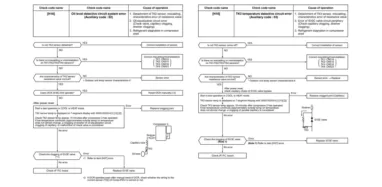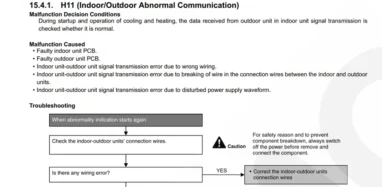These days, almost all houses have air conditioners that run at their peak when the summer months kick in. After all, who wouldn’t want to stay comfortable and relaxed, right? But how about during those cold days of winter? Can you still run your AC unit? When is it too cold to run the air conditioner in the first place?
While many people believe that air conditioners only work to cool down a room, this is not the case. Today’s air conditioners can regulate temperature based on your preferences both during the summer and winter months.
During the winter season, the function of an air conditioner is reversed to let the unit run more efficiently and make your room warmer. However, although air conditioners can work in winter, you still need to note a few safeguards to ensure more effective heating. Read on to know more about using your air conditioner when the weather turns cold.
When is it too cold outside to run air conditioner?
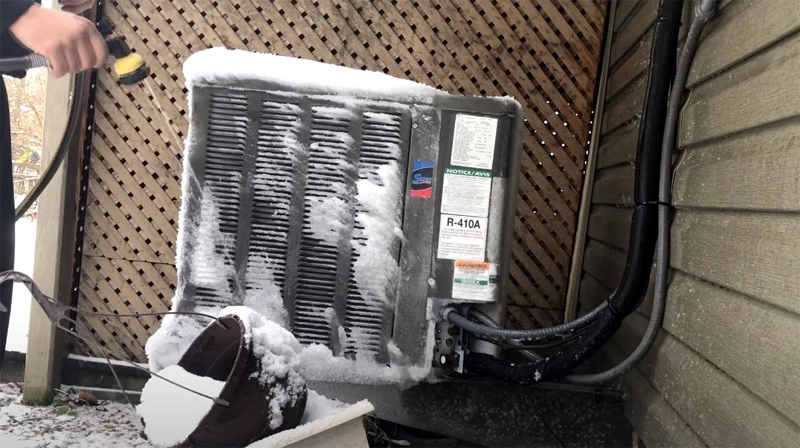
Just like you and the rest of the appliances you have at home, the operation of air conditioning units also have their minimum threshold and anything below this will render them unable to work as they are meant to do so. No matter what brand, type, or model of your AC unit might be, there will always be a minimum limit for its operating temperatures.
In general, the minimum temperature outdoors is about 60 degrees Fahrenheit for air conditioners to work. Anything colder than this will make the refrigerant behave differently and the unit will no longer work as it was supposed to. Running your air conditioner lower than this temperature may lead to damages to your appliance like a thickened lubricant, frozen refrigerant coils, and damaged bearings and moving parts.
Running air conditioner in cold weather
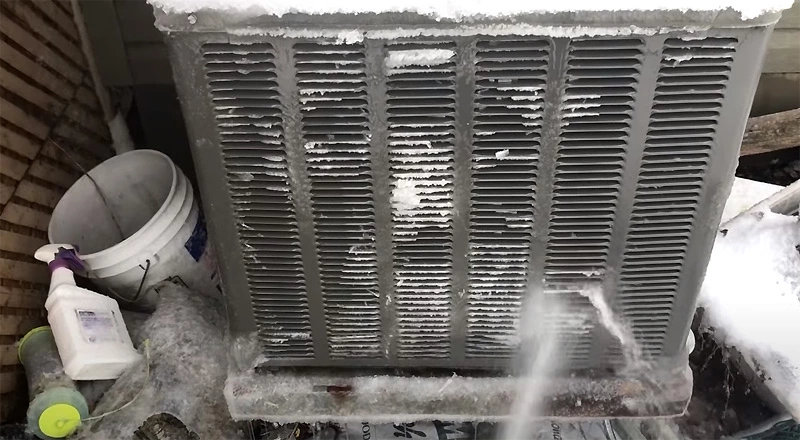
Running your air conditioner during cold weather is not really a good idea. An air conditioner that has a condensing unit is not meant to be used in colder months. These units have oil content that is used for lubricating the compressor and this is heavy grade oil that can work best under warm conditions. Once the weather turns cold, this oil can turn thicker and as a result, it won’t be able to help in the proper lubrication of the compressor.
If lighter grade oil is contained in the AC compressors, they would be able to work during winter yet you will be facing the exact opposite problem. During warmer months, the oil can heat up to the extent that it won’t be able to offer enough lubrication that can pose the risk of damages to the compressor.
Many people don’t really like cooling their homes if it is already chilly outside, which is why HVAC manufacturers use summer-weight oils in their products. One more concern about running your AC when it is cold is that when condensation occurs on the cooling coil, this might freeze and cause damages to the unit.
Testing AC in cold weather
Many HVAC professionals and air conditioning manufacturers agree that outdoor condensing units shouldn’t run during cold weather at any time for any reason. This is because the oil used for lubricating the compressor doesn’t lubricate properly if it is cold. A home air conditioning unit’s lubricant is similar to your car’s lubricant. This is why it is best to wait until the weather is warmer before testing your AC.
Running AC below freezing
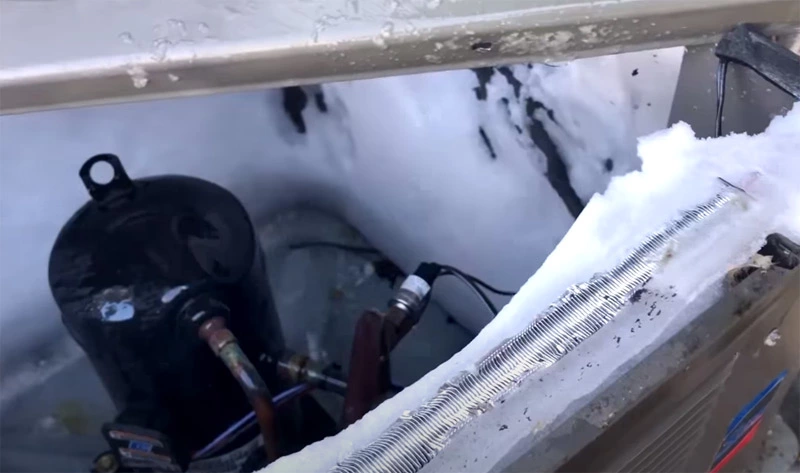
Running your AC below freezing comes with risks. If the temperatures are moderately cold, it is perfectly acceptable for AC units to run in different modes. However, if the temperatures are lower than 60 degrees Fahrenheit, using your air conditioner will result in some risks. Here are some of the issues associated with running your AC unit below-freezing temperatures:
- Frozen coiling coils
You might see some water that drips from your outdoor unit when your AC is in use. This water is the condensation from outdoor copper coils. During winter, the condensed water could freeze and accumulate over the coils. Once ice freezes over the coils, the air won’t heat up as it is thrown to the room. The louvers will only release cold air.
The outdoor unit might also get damaged if freezing occurs. Running your AC unit when it is frozen might create punctures on the cooling coils that might require replacement soon.
- Loss of lubrication
An integral part of your AC is the compressor and this must be in tiptop shape to continue functioning as desired. Lubricants can help in the smooth operation of the compressor so that it will function with no faults. However, the lubricant may thicken in winter and fail to function as expected. With no proper lubrication, seizure and damage might occur in the compressor.
- Low Ambient Temperature Sensor
Today’s AC units feature a low ambient temperature sensor. It is to stop the unit from operating during extremely cold conditions and avoid damage. Circumventing this sensor and turning on the unit even when the temperatures are low can lead to expensive repairs.
- Overheating Compressor
A compressor will heat up more if you use it. During extremely chilly conditions, the compressor needs to work overtime for your home to stay warm and this may result in overheating. Using your AC below the minimum recommended temperature may cause irreversible damages to it or result in significant repairs.
Why would someone run their air conditioner in the winter?
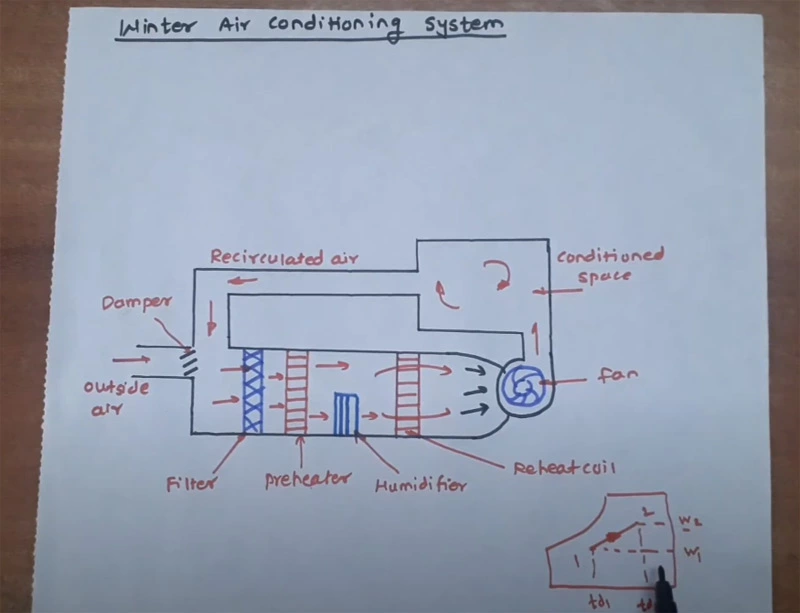
Air conditioners offer a lot of benefits the air filtration system is the one most relevant during the winter months. Winter is that time of the year when people spend most of their time in close confinement indoors together with other people, particularly during the holidays.
AC units can help keep the air inside the house fresh and even free from dust particles as well as other pollutants. It can also help control the spread of germs. Great for people with allergies, your pets at home will no longer make your guests sneeze or dab at their watery eyes.
What temperature to set air conditioner in winter?
The temperature of a standard air conditioner must be set at about 60 to 65 degrees Fahrenheit for heating during winter. It is to guarantee that your unit will have its maximum energy efficiency. Take note that these temperatures are assuming you live in a place with a moderate climate.
What is the coldest temperature for an air conditioner?
The coldest temperature limit is often anywhere lower than 60 degrees Fahrenheit. It is not recommended to turn your AC on if the minimum temperature outdoors is below this. Once you do so, the unit’s inner coil will freeze and the lubricating oil can thicken and hamper the function of the unit. Both of these will ultimately damage your air conditioner.
